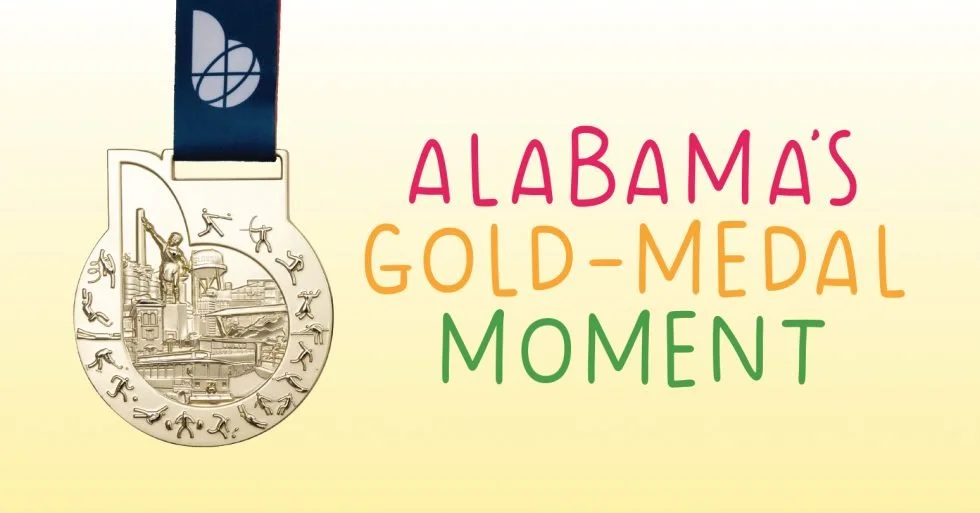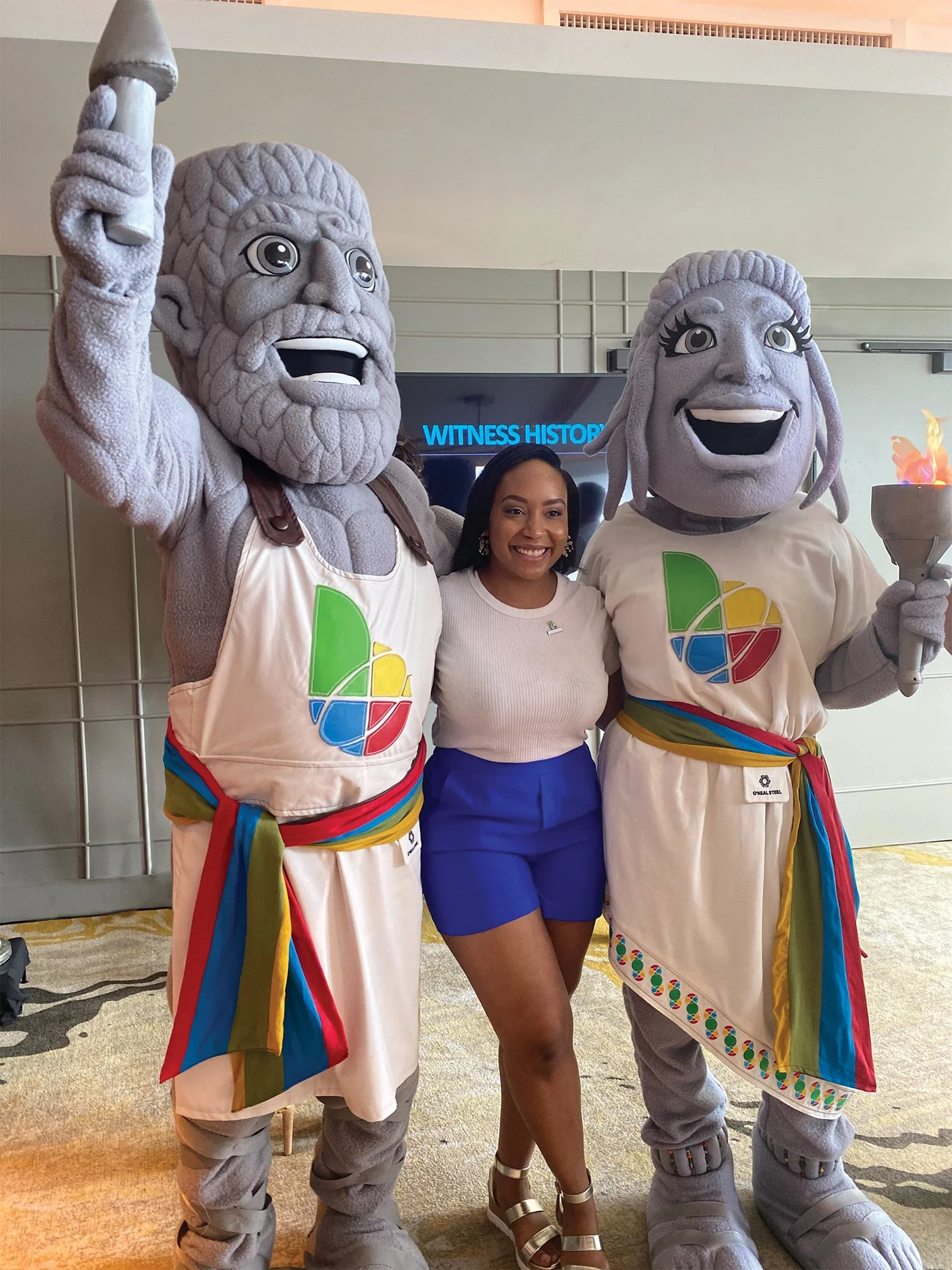This summer, the 2022 World Games are coming to Birmingham. Three alumni explain how “The World’s Largest Sports Party” came together
THE 2022 WORLD GAMES ARE COMING to Birmingham, Ala., and for two weeks in July, the eyes of the world will be watching. Half a million visitors and 3,600 athletes from around the globe are coming to stay, play and soak in the Southern hospitality. It’s no understatement to say that the 2022 World Games could be a watershed moment in Alabama’s history.
“This is a special moment for our state,” said 2022 World Games CEO Nick Sellers. “The rest of the world—and frankly, the rest of the country outside of the Southeast—thinks about Birmingham and the state of Alabama in black and white, and I’m not talking about race. I’m talking about the old black-and-white images of Birmingham. I cannot think of a better opportunity to help the world reimagine Birmingham as a new medical capital of the South, with a ton of innovation happening, that’s finally embracing its differences in its diversity. We aren’t perfect, but we certainly have come a long way, and people will be amazed at what they’re seeing in the city.”
One of the planet’s largest sporting events, the World Games are part of the Olympic Movement under the International Olympic Committee. First held in Santa Clara, Calif. in 1981, the games encompass nontraditional and emerging sports from around the globe.
Sellers was with Alabama Power for nearly 20 years, most recently as vice president of its Mobile, Ala. division, and also chaired the Alabama Sports Council. His time as CEO of the World Games was supposed to be just 18 months before the COVID pandemic added quarantine challenges, supply chain shortages and more.
“It’s truly been the ride of a lifetime for me,” said Sellers.
The World Games, unlike the Olympics, uses existing arenas and infrastructure to host events, dovetailing with Birmingham’s ongoing urban revitalization.
Protective Stadium, completed in 2021, will host the World Games’ opening and closing ceremonies, while the new City Walk—a series of beer and wine gardens, dog parks, skate parks and “activation areas”—will connect competition venues with public recreation areas across different neighborhoods, a goal for county officials for decades.
A reason Birmingham’s bid was so appealing to the International World Games Association (IWGA) was because it was their first event in the U.S. since 1981, and the Magic City is happy to oblige.
“Just like any great athlete who’s struggled, it’s the ones who keep going that have their chance to compete for a gold medal,” said Sellers. “And that’s really the story of Alabama. Alabama’s certainly had its struggles and failures and setbacks along the way, but this is our ‘medal moment,’ and the more we can create that sense and feeling, the more it becomes reality.”
THE ROAD TO BIRMINGHAM began at the 2013 World Games in Cali, Colombia, where a contingent was invited to attend and later submit hosting bids for what was, at the time, the 2021 World Games.
Primarily data related, the proposal covered Birmingham’s history, its summer climate and the contingent’s overarching vision for the games. It totaled 360 pages. When the Birmingham contingent needed someone to coordinate the various stages and elements of the process, they turned to Steve Mistrot ’97.
Born and raised in Birmingham, Mistrot worked in television after graduating from Auburn, eventually making his way to sports operation for major events like the 1998 Winter Olympics in Nagano, Japan. After returning to Birmingham with his family, he assumed his days of international sports events were behind him—until the World Games came along.
In January 2015 at Lausanne, Switzerland—home of the International Olympic Committee—Birmingham was selected over Lima, Peru, and Ufa, Russia. That’s when the real work began.
As vice president of sport for the World Games Organizing Committee, Mistrot’s first task was getting to know each of the 37 unique sports federations who oversee various “disciplines,” or sporting events. Each federation applies to the IWGA, which evaluates disciplines for audience response, athlete variety and novelty or excitement.
Sumo wrestling, for example, is one discipline within the Martial Arts Federation, but contains multiple weight classes in both men’s and women’s divisions. Roller sports and gymnastics each have six or seven disciplines alone. From 34 selected federations come 60 individual competitions spread out across 25 venues. From the types of venues to the specialized equipment, it’s taken years of planning.
With each approaching day, the granular details of every event are magnified. All the planning to this point has been organizing the functional areas from the top down—identifying venues and understanding each sport. Now that details are being finalized, event and venue prep are coming together as one.
“Any event is an organism with many parts,” said Mistrot. “What I value most out of all the different events that I’ve worked on, is how you get different input from different perspectives. It seems like it’s a recipe for conflict, but it’s really a recipe for greater success. You take the best of everybody’s ideas and combine it into a solution. It’s a challenge, and it forces you to establish really strong relationships. You come out of these events with people that you stay in touch with for life, so it’s very rewarding.”
Mariah Gullatte with Vulcan and Vesta, the mascots of the 2022 World Games in Birmingham
MEET VULCAN AND VESTA
When visitors arrive this summer, the first thing many will see are the mascots “Vulcan” and “Vesta,” wearing outfits designed by Auburn alumna Mariah Gullatte ’19.
Vesta was created specifically for the 2022 World Games, holding the Olympic Torch and wearing a dress that reimagines the World Games logo along the hemline.
Vulcan, the symbol of Birmingham and the largest iron sculpture in the world, was an obvious mascot. He’s also known for “mooning” the city’s east side. “That was a discussion topic—‘to cover’ or ‘not to cover,’” said Gullate.
The College of Human Sciences graduate spent almost two years developing their outfits with the organizing committee. When Vulcan and Vesta were finally introduced wearing her clothes in July 2021, it was both nerve wracking and exciting.
After earning her master’s in hospitality management in August 2021, Gullate opened her online boutique, Princess Closet Designs, where she will continue creating custom garments and new outfit collections. Though she lives in Huntsville, she already plans to attend the World Games and looks forward to seeing Vulcan and Vesta mingle with the thousands of visitors.
“That’s the part I’m looking forward to the most, getting to see other people meet them and people interact with them and their outfits. It’s super rewarding to see something you worked so hard on come to life.”
IN THE 10 DAYS OF THE 2022 WORLD GAMES an estimated half-million or more people will arrive in Birmingham. To run everything smoothly, 3,300 volunteers—including 250 international volunteers—have been training for months. Matt Gaines ’86, head of volunteer training, oversees them all.
A former engineer with Alabama Power, Gaines designed high-voltage electrical switchgear for nuclear power plants.
When he got tired of that, he went to Southwestern Baptist Seminary, got a master’s in music and worked in churches, schools and nonprofits around the world.
“It’s like we’re building an airplane in midflight—that’s what it feels like,” said Gaines. “I will always be grateful for my mechanical engineering degree from Auburn, because it taught me how to think and solve problems. In engineering, you learn to put a control volume around the situation to study everything coming in and out to know how to solve the problem. I use that in every part of my life.”
From preparing arenas and equipment to directing guests around town, volunteers will play an incredibly important role at the World Games.
Training began months ago, covering everything from communications exercises, to the history of Birmingham and the World Games, to etiquette training for various cultural differences volunteers may encounter. They also took disability and inclusion training from the Lakeshore Foundation to help prepare in advance for the wheelchair rugby event. Volunteers were even given training on how to notice and report human trafficking, a major issue at large events, said Gaines.
Another major hurdle is communicating with fans and athletes from more than 100 countries who speak upwards of 26 different languages.
Designated “live speaker” volunteers for five primary languages—French, German, Spanish, Chinese and Japanese—will provide basic fluency, while the University of Alabama at Birmingham (UAB) is providing software that instantly connects to 100 different native speakers around the world in a virtual, face-to-face format.
Medical volunteers at UAB are also staffing the events to attend to any potential medical emergencies, whether on the field or off.
The only job duty not handled by volunteers will be security. Homeland Security designated the World Games as a Special Event Assessment Rating (SEAR) of 1 for “significant events with national and/or international importance that require extensive federal interagency support,” the same designation as presidential inaugurations. In addition to Birmingham police, the FBI, Army Rangers and others will provide security during the games.
But it’s not just the organizing committee rising to the moment—schools are using education models to teach students about the sports as well.
In a world rife with war, disease, misinformation and hostility, this could be just the thing to bring it together again.
“Things like this connect us in a world that desperately needs connection,” said Gaines. “I believe this event will help change the world for the better.”

